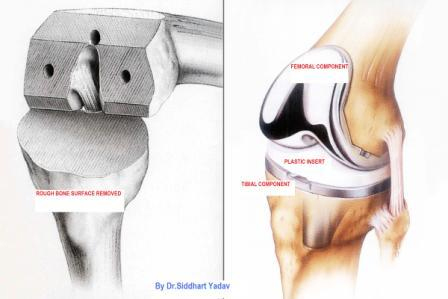In this operation, damaged cartilage - bone are removed and then replaced with a ball & socket to restore the alignment and function of hip joint. Many different types of designs and materials are currently used in artificial hip joints. All of them consist of two basic components: the ball component (made of a highly polished strong metal or ceramic material) and the socket component (a durable cup of plastic, ceramic or metal, which may have an outer metal shell). Special surgical cement may be used to fill the gap between the prosthesis and remaining natural bone to secure the artificial joint. A non cemented prosthesis has also been developed which is used most often in younger, more active patients with strong bone. The prosthesis may be coated with textured metal or a special bone-like substance, which allows bone to grow into the prosthesis.

